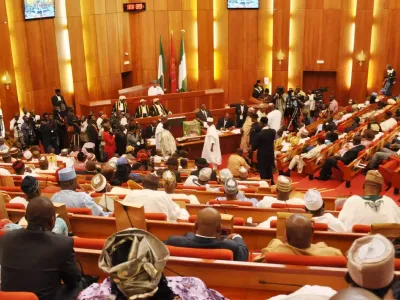
The Senate has approved the 2025-2027 Medium Term Expenditure Framework (MTEF) and Fiscal Strategy Paper (FSP), projecting a total expenditure of ₦47.9 trillion for 2025 and a borrowing plan of ₦9.22 trillion for both domestic and foreign debts.
The approval followed the presentation of a report by the Senate Joint Committee on Finance, National Planning, and Economic Affairs, co-chaired by Senators Sani Musa and Yahaya Abdullahi, during plenary.
The framework includes an oil price benchmark of $75 per barrel for 2025, $76.2 for 2026, and $75.3 for 2027, with daily crude oil production set at 2.06 million, 2.10 million, and 2.35 million barrels respectively. The exchange rate is projected at ₦1,400 to $1, while GDP growth rates are estimated at 4.6%, 4.4%, and 5.5% over the three years.
Debt servicing is allocated ₦15.38 trillion, pensions and gratuities ₦1.443 trillion, and capital expenditure ₦16.48 trillion. Statutory transfers are pegged at ₦4.26 trillion, while recurrent (non-debt) spending stands at ₦14.21 trillion. The fiscal deficit is projected at ₦13.08 trillion, with inflation rates expected to decline from 15.75% in 2025 to 10.04% in 2027.
The Senate directed its committees on Finance, Petroleum Upstream, and Petroleum Downstream to investigate claims that the Nigerian National Petroleum Company Limited (NNPCL) withheld ₦12.08 trillion in petrol subsidies and failed to remit $2 billion (₦3.6 trillion) in taxes. The investigation will also cover unremitted revenues from Premium Motor Spirit (PMS) sales between 2020 and 2023.
The National Assembly’s committees were further tasked with examining Public-Private Partnerships (PPP) and Joint Venture Agreements (JVA) involving the NNPCL, NLNG, and Immigration Services to reconcile remittances to the Federation Account.
The Senate also approved quarterly investigative hearings with revenue-generating agencies to ensure compliance with the Fiscal Responsibility Act, while recommending performance metrics and independent audits for underperforming ministries, departments, and agencies.
The framework will guide the preparation of Nigeria’s 2025 federal budget, aimed at achieving fiscal balance and sustainable economic growth.
Comments